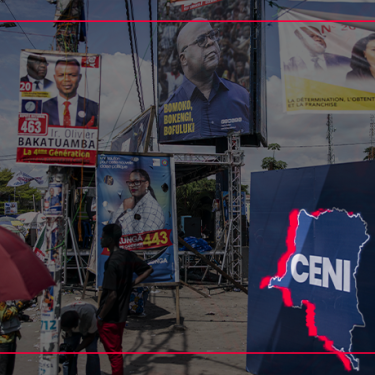Reporters must be able to cover DRC presidential election freely and safely

Reporters Without Borders (RSF) calls on the authorities in the Democratic Republic of Congo (DRC) to protect journalists and ensure they are free to report during the country’s presidential election, which is being held since 20 December. After a campaign that did not spare journalists, they must be protected during and after the election, RSF insists.
During the presidential election campaign, which was launched on 19 November and officially ended on 18 December, at least five journalists were threatened and attacked by politicians or their supporters, mainly in the eastern cities of Goma and Béni (in NorthKivu province) and in Bunia (in Ituri province). In Bunyakiri (in South Kivu province), reporters were denied access to public places and, therefore, from being able to do their job.
“It is deplorable to see journalists attacked or prevented from working when their reporting is essential to the electoral process. We call on the Congolese authorities to put an end to this kind of obstruction, to protect reporters and to allow them unrestricted coverage of the presidential election. The authorities must also take care not to cut off Internet access during and after the election, in order not to restrict the public’s access to information. We will also be waiting to see whether the incoming president takes a firm stance in support of press freedom, and undertakes to combat impunity for abuses against journalists.
The latest incident was a few days ago, on 16 December. René Mobembo, the editor-in-chief of Liberté Makanza, a privately-owned radio station based in Makanza, in the northwestern province of Equateur, was violently attacked during a meeting of the Let’s Act for the Republic Party (AREP). Activists beat him on the orders of an AREP affiliated politician on the grounds that his radio station is owned by the current Defence Minister. Mobembo had to be taken to hospital.
A week before that, Mao Zigabe, the Digital Congo TV channel’s correspondent in Goma, was violently attacked by suspected members of the ruling Union for Democracy and Social Progress (UDPS). On 5 December, four soldiers fired into the air outside the home of Radio Liberté reporter Nekyer Tokolo in Lisala (north) and threw four tear gas grenades into his home.
In the northern city of Kisangani, on 27 November, around ten members of the Union for the Congolese Nation (UNC) attacked Jerry Lombo Alauwa, a reporter for the Canal Congo Télévision channel and radio Liberté Kisangani, while he was covering a rally by opposition presidential candidate Moïse Katumbi. Alauwa was hit in the head, his hand was injured, and his camera was damaged.
John Kanyunuy, a reporter for Deutsche Welle’s Kiswahili service and editor of the “Nouvelles à la Une” WhatsApp news group, received online death threats on 25 November, from alleged members of the Sacred Union, a political group that supports President Félix Tshisekedi’s reelection campaign. They accused Kanyunuy of campaigning for Katumbi, an allegation he immediately denied. He told RSF that he is concerned for his safety and warned that he could be arrested because his journalistic independence “scares” some people.
Two days before that, on 23 November, a group of journalists who were covering Katumbi’s arrival in Bunia, were denied access to the airport by security forces, who had reportedly received “instructions from superiors in Kinshasa to allow no one in,” RSF was told. The same day, soldiers denied other journalists access to Goma airport, where Katumbi was holding a political meeting.
Poor record
Aside from the presidential campaign’s press freedom violations, President Tshisekedi’s five- year term has been marked by many serious abuses against journalists, included three murders, two enforced disappearances, many death threats, and at least 123 arbitrary arrests, including that of Stanis Bujakera, who continues to be held.
On 19 October, RSF issued an appeal to the 24 presidential candidates to make ten public undertakings to support press freedom and promote the safety of journalists in the DRC. Three have so far signed.
